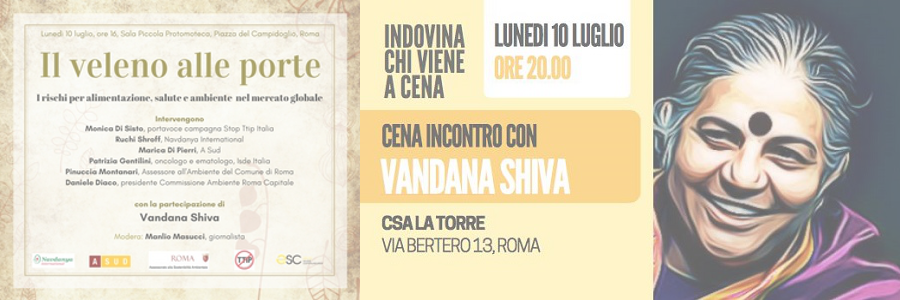
Program of Navdanya International events in Rome, on 10 July 2017, on the occasion of Dr Vandana Shiva’s presence in Rome.
Monday 10 July – 4pm
Conference: Poisons at the Door
Food, health and environmental risks in the new global market
Venue: Sala Piccola Protomoteca, Piazza del Campidoglio, Rome
The event, promoted by Esclab association, will feature the following speakers:
Dr Vandana Shiva, scientist and environmental activist;
Pinuccia Montanari, Councilor for the Environment at Rome Municipality;
Daniele Diaco, President of the Environmental Commission of Roma Capitale;
Dr Patrizia Gentilini, oncologist and hematologist of ISDE Italy.
Associations will be represented by:
Monica Di Sisto, spokesperson of Stop Ttip Italy, Ruchi Shroff, Navdanya International, Marica Di Pierri, A Sud.
Moderator: Manlio Masucci, journalist.
Read more
Monday 10 July – 6pm
Protest against the shut down of public drinking fountains
organised by Terra! Onlus and Associazione 21 luglio, with the participation of Coordinamento Romano Acqua Pubblica and Navdanya International
Venue: Protomoteca stairs in Piazza del Campidoglio, Rome
In Rome the historical drinking fountains called “nasoni (big noses)” and built in 1874 are being shut down, following the order of Rome Municipality and its Mayor, Virginia Raggi. The total number of fountains is 2800 and every day 30 of them will be shut down until a narrow number of 85 will be left open. An extreme measure, based on fears of scarcity of water supply in Italy, because of summer dryness.
But is there evidence of such a problem? According to data made available by the Water Movement Forum, the “nasoni” only waste 1% of the water bodies of Lazio flowing into the capital.
The real problem, instead, are leaks in the old pipes, where the waste is 40% of the whole water volume. Importantly, institutions should understand that the present extreme weather conditions will only get worse overtime and adequate policies based on environmental and social justice must be put in place. The right to water is part of the Universal Human Rights Declaration and was ratified also at the European Parliament in 2015. Shutting down public drinking water fountains is against these basic principle. Moreover it represents an interruption of a public service and forces people to buy plastic water bottles, worsening the garbage crisis. Furthermore this act is denying access to water to 10.000 people who are homeless or with no fixed abode and who rely on public fountains. These people are not responsible of global warming, why should they bear the consequences of it?
We will ask the Mayor to stop this process at a demonstration in Piazza del Campidoglio on July 10th at 6pm. We will hold empty reusable cups in our hands as symbol of protest.
Monday 10 July – 8pm
Guess Who’s Coming to Dinner
Dinner meeting with Dr Vandana Shiva
Venue: Csa La Torre, Via Bertero 13, Rome, Italy
In the Framework of CLIM’ACT CAMP, an international camp on climate change organized within the framework of the European project Clim’Act coordinated by A Sud together with Accion Ecologica, Environmental Rights Action – FoEN and ZaZemiata.
Right to Food and Climate change are interconnected issues. Firstly the widespread industrial agribusiness model is one of the major contributors to greenhouse gases emissions which are the main cause of the present climate crisis. Secondly, global warming and extreme weather events have a huge impact on people’s livelihoods in the Global South. Desertification, drought, coastal erosion and violent cyclones threaten food security for millions of people and push many of them off the land, in a forced migration caused by the lack of basic resources.
With scientist and environmental activist Dr Vandana Shiva we will discuss these topics, with a focus on health risks caused by an industrial agriculture model based on concentration of power, seed monopoly and control and intensive use of chemicals. We will explain how small ecological farming can produce more food, good food, in harmony with the earth, as well as being the solution to reverse climate change.
